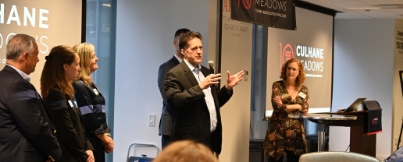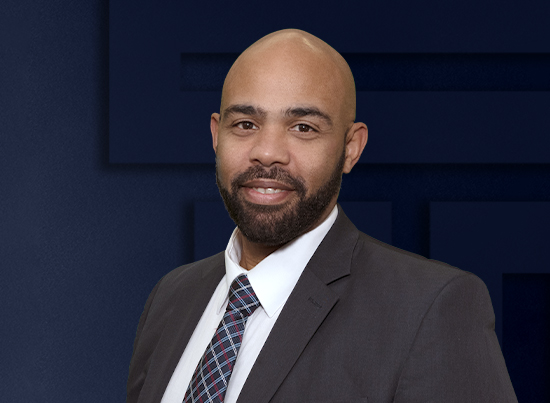Culhane Meadows’ Philadelphia partner Sekou Campbell recently authored an article published in Bloomberg Law which discusses how work-for-hire agreements can be used to foster diversity in filmmaking.
Sekou Campbell, partner at Culhane Meadows, analyzes new ways that the film industry is using IP, copyright, and contract law to combat systemic diversity issues and create more equity for all stakeholders.
Commentators have called this coming awards season “#OscarsSoWhite redux” because of snubs to films such as “Nope,” “Till,” and “The Woman King.” The issues mirror industry-wide concerns that American film doesn’t adequately depict the diverse set of voices and narratives reflected in its people.
Industry practice and the law conspire to mute or grossly distort voices from marginalized communities much like those in this year’s Academy Awards.
The work made for hire doctrine plays a significant role in how marginalized communities are excluded from the critical storytelling functions of the film and television industry.
Copyright Law
The US Copyright Act defines “works made for hire” as all content created within an employee’s “scope of employment” and specially ordered content produced by independent contractors in certain enumerated types of media—e.g., collective works and audiovisual works.
The doctrine serves a critical function for media projects that often involve collaboration of vast numbers of contributors.
Other ways to transfer copyrights impose significant administrative costs on a production because the scope of each license, assignment, or other transfer of copyright interests could contain geographic, term, scope of use, and other limitations susceptible to a many negative effects.
The loss of a contributor’s right of reversion—a right to reclaim the copyright monopoly from a transferee—may be the most salient benefit of a work made for hire relationship, which has been the subject of an ongoing lawsuit in the music industry. Without that loss of reversion, a single dissenting contributor could force a classic film out of distribution.
Courts focus on the legal concept of agency when developing the work made for hire doctrine. Agents have some power over their own actions despite their actions on behalf of a principal, and agency law has developed rules around when one acts for one’s self or another.
Under copyright law, once artwork fits within the definition of a work made for hire, the copyright is transferred in toto to the hiring party for the life of the copyright.
The legal authorship of the contributing artist basically disappears, and all that remains are contractual obligations agreed to between the principal and agent.
Diversity Impact
On its face, this arrangement doesn’t seem particularly discriminatory or non-inclusive. In reality, the majority of principals tend to be white and male, and members of marginalized communities who make artwork contributions often don’t get any say in decision-making.
Because of the enduring legacy of segregation in American society, individuals in marginalized communities suffer a greater risk of misrepresentation.
Courts and scholars have long struggled with these concepts of authorship. Some have pointed to the EU’s moral rights jurisprudence and the US’s limited version of it under the Visual Artists Rights Act, but works made for hire are expressly excluded from VARA.
Its integrity right—preventing “distortion, mutilation, or other modification of the work which would be prejudicial to his or her honor or reputation”—may help productions take advantage of the benefits of work made for hire without imposing the burdens on marginalized populations.
Recommendations
Such a restriction on works made for hire could be generally applied or, to borrow from anti-discrimination statutes, limited to certain protected classes that are particularly under-represented in large-scale media projects.
In either case, protecting integrity after transfers of copyright will make for more equitable circumstances and will produce better, more authentic projects that reflect the rich tapestry of the American population.
Considering the last major revision to the Copyright Act occurred nearly 50 years ago, producers probably shouldn’t wait for changes in the work made for hire statutory definition.
Since most works made for hire are created through a written agreement, a contract could license back certain integrity rights or provide for some consultation, or even approval rights in the use of certain aspects of a creative contribution.
Developing these kinds of contractual clauses may help practitioners develop a sense of those items that “would be prejudicial to [the] honor or reputation” of marginalized groups.
In addition to curing the perceived symptoms of an inequitable system by reversing #OscarsSoWhite, perhaps the industry can make structural changes that simultaneously protect minority voices and develop better creative projects.
Specifically, the film industry can integrate a more robust integrity right into works by artistic contributors, which may help hold producers accountable to more marginalized groups who face the most significant risk of a loss of integrity.
This article does not necessarily reflect the opinion of Bloomberg Industry Group, Inc., the publisher of Bloomberg Law and Bloomberg Tax, or its owners.
Link to the article HERE
Reproduced with permission. Published February 15, 2023. Copyright 2023 Bloomberg Industry Group 800-372-1033. For further use please visit https://www.bloombergindustry.com/copyright-and-usage-guidelines-copyright/
About Culhane Meadows – Big Law for the New Economy®
The largest woman-owned national full-service business law firm in the U.S., Culhane Meadows fields over 70 partners in eleven major markets across the country. Uniquely structured, the firm’s Disruptive Law® business model gives attorneys greater work-life flexibility while delivering outstanding, partner-level legal services to major corporations and emerging companies across industry sectors more efficiently and cost-effectively than conventional law firms. Clients enjoy exceptional and highly-efficient legal services provided exclusively by partner-level attorneys with significant experience and training from large law firms or in-house legal departments of respected corporations. U.S. News & World Report has named Culhane Meadows among the country’s “Best Law Firms” in its 2014 through 2023 rankings and many of the firm’s partners are regularly recognized in Chambers, Super Lawyers, Best Lawyers and Martindale-Hubbell Peer Reviews.
The foregoing content is for informational purposes only and should not be relied upon as legal advice. Federal, state, and local laws can change rapidly and, therefore, this content may become obsolete or outdated. Please consult with an attorney of your choice to ensure you obtain the most current and accurate counsel about your particular situation.









